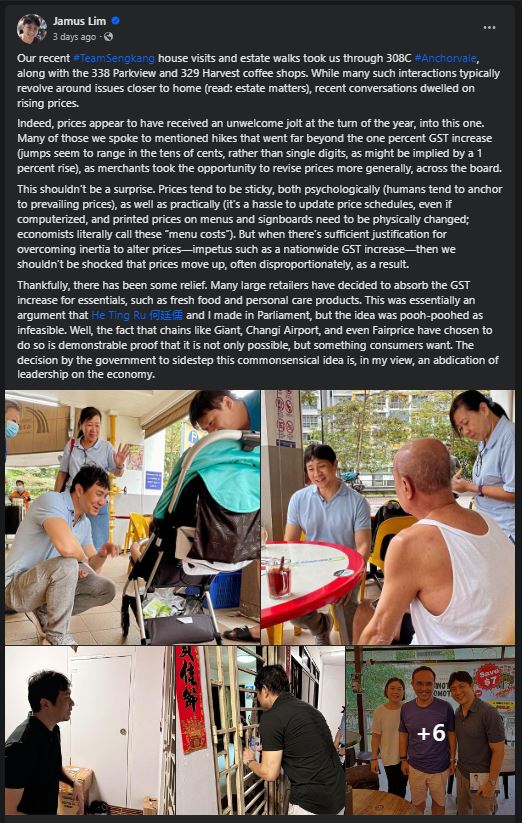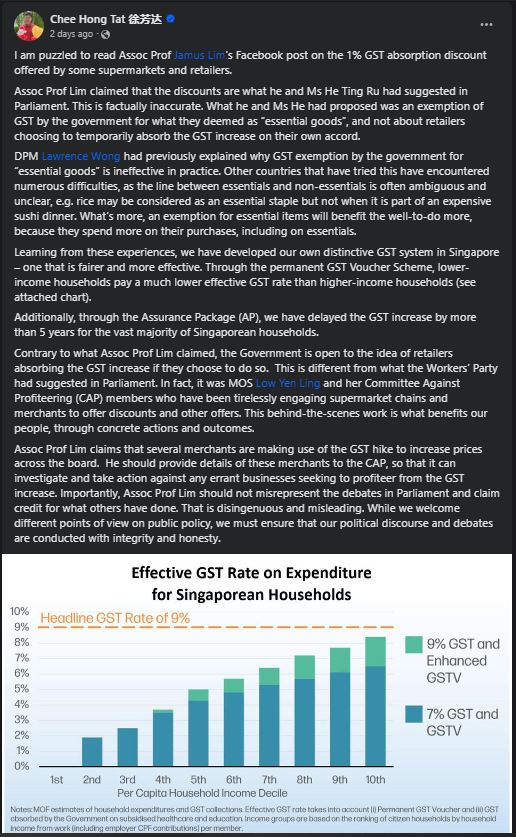Social media became the battleground for a fiery exchange between Workers’ Party Member of Parliament (MP) Jamus Lim and Senior Minister of State for Finance Chee Hong Tat.
The disagreement erupted following a post by Lim on Facebook, wherein he delved into the implications of the recent Goods and Services Tax (GST) hike, before Chee responded with a Facebook post of his own.
Jamus Lim’s Facebook Post
Our recent #TeamSengkang house visits and estate walks took us through 308C #Anchorvale, along with the 338 Parkview and 329 Harvest coffee shops. While many such interactions typically revolve around issues closer to home (read: estate matters), recent conversations dwelled on rising prices.
Indeed, prices appear to have received an unwelcome jolt at the turn of the year, into this one. Many of those we spoke to mentioned hikes that went far beyond the one percent GST increase (jumps seem to range in the tens of cents, rather than single digits, as might be implied by a 1 percent rise), as merchants took the opportunity to revise prices more generally, across the board.
This shouldn’t be a surprise. Prices tend to be sticky, both psychologically (humans tend to anchor to prevailing prices), as well as practically (it’s a hassle to update price schedules, even if computerized, and printed prices on menus and signboards need to be physically changed; economists literally call these “menu costs”). But when there’s sufficient justification for overcoming inertia to alter prices—impetus such as a nationwide GST increase—then we shouldn’t be shocked that prices move up, often disproportionately, as a result.
Thankfully, there has been some relief. Many large retailers have decided to absorb the GST increase for essentials, such as fresh food and personal care products. This was essentially an argument that He Ting Ru 何廷儒 and I made in Parliament, but the idea was pooh-poohed as infeasible. Well, the fact that chains like Giant, Changi Airport, and even Fairprice have chosen to do so is demonstrable proof that it is not only possible, but something consumers want. The decision by the government to sidestep this commonsensical idea is, in my view, an abdication of leadership on the economy.

Chee Hong Tat’s Response
I am puzzled to read Assoc Prof Jamus Lim’s Facebook post on the 1% GST absorption discount offered by some supermarkets and retailers.
Assoc Prof Lim claimed that the discounts are what he and Ms He Ting Ru had suggested in Parliament. This is factually inaccurate. What he and Ms He had proposed was an exemption of GST by the government for what they deemed as “essential goods”, and not about retailers choosing to temporarily absorb the GST increase on their own accord.
DPM Lawrence Wong had previously explained why GST exemption by the government for “essential goods” is ineffective in practice. Other countries that have tried this have encountered numerous difficulties, as the line between essentials and non-essentials is often ambiguous and unclear, e.g. rice may be considered as an essential staple but not when it is part of an expensive sushi dinner. What’s more, an exemption for essential items will benefit the well-to-do more, because they spend more on their purchases, including on essentials.
Learning from these experiences, we have developed our own distinctive GST system in Singapore – one that is fairer and more effective. Through the permanent GST Voucher Scheme, lower-income households pay a much lower effective GST rate than higher-income households (see attached chart).
Additionally, through the Assurance Package (AP), we have delayed the GST increase by more than 5 years for the vast majority of Singaporean households.
Contrary to what Assoc Prof Lim claimed, the Government is open to the idea of retailers absorbing the GST increase if they choose to do so. This is different from what the Workers’ Party had suggested in Parliament. In fact, it was MOS Low Yen Ling and her Committee Against Profiteering (CAP) members who have been tirelessly engaging supermarket chains and merchants to offer discounts and other offers. This behind-the-scenes work is what benefits our people, through concrete actions and outcomes.
Assoc Prof Lim claims that several merchants are making use of the GST hike to increase prices across the board. He should provide details of these merchants to the CAP, so that it can investigate and take action against any errant businesses seeking to profiteer from the GST increase. Importantly, Assoc Prof Lim should not misrepresent the debates in Parliament and claim credit for what others have done. That is disingenuous and misleading. While we welcome different points of view on public policy, we must ensure that our political discourse and debates are conducted with integrity and honesty.

